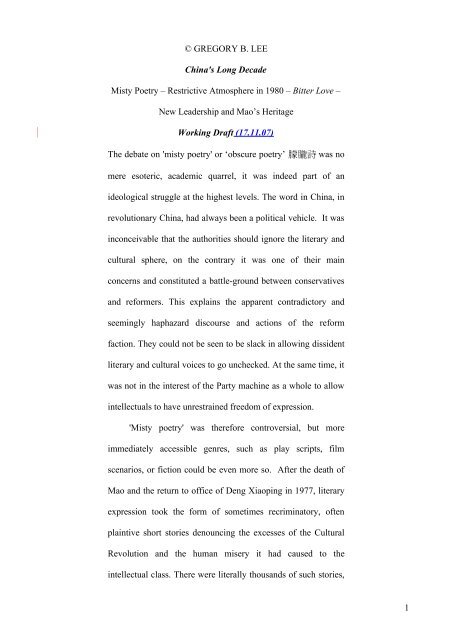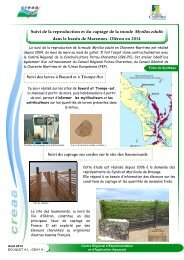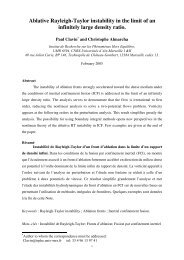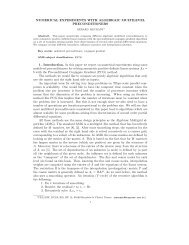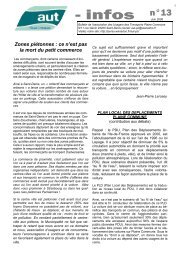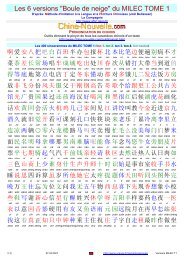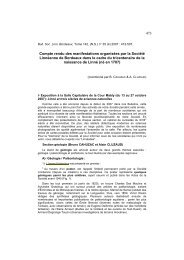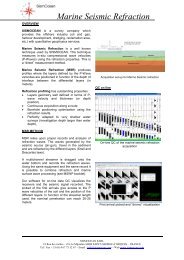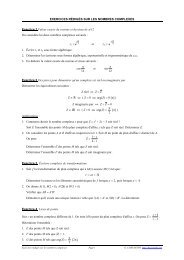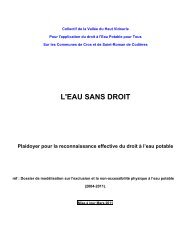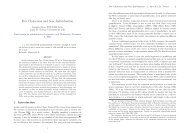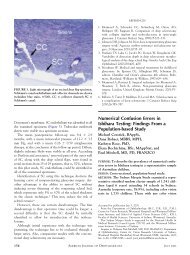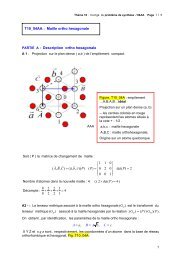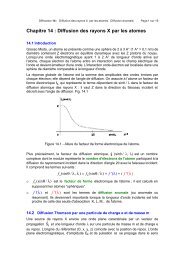GREGORY B
GREGORY B
GREGORY B
You also want an ePaper? Increase the reach of your titles
YUMPU automatically turns print PDFs into web optimized ePapers that Google loves.
© <strong>GREGORY</strong> B. LEEChina's Long DecadeMisty Poetry – Restrictive Atmosphere in 1980 – Bitter Love –New Leadership and Mao’s HeritageWorking Draft (17.11.07)The debate on 'misty poetry' or ‘obscure poetry’ 朦 朧 詩 was nomere esoteric, academic quarrel, it was indeed part of anideological struggle at the highest levels. The word in China, inrevolutionary China, had always been a political vehicle. It wasinconceivable that the authorities should ignore the literary andcultural sphere, on the contrary it was one of their mainconcerns and constituted a battle-ground between conservativesand reformers. This explains the apparent contradictory andseemingly haphazard discourse and actions of the reformfaction. They could not be seen to be slack in allowing dissidentliterary and cultural voices to go unchecked. At the same time, itwas not in the interest of the Party machine as a whole to allowintellectuals to have unrestrained freedom of expression.'Misty poetry' was therefore controversial, but moreimmediately accessible genres, such as play scripts, filmscenarios, or fiction could be even more so. After the death ofMao and the return to office of Deng Xiaoping in 1977, literaryexpression took the form of sometimes recriminatory, oftenplaintive short stories denouncing the excesses of the CulturalRevolution and the human misery it had caused to theintellectual class. There were literally thousands of such stories,1
the better known and better written were 'The Form Teacher' ( 班主 任 ) by Liu Xinwu 劉 心 武 , and the story that would lend itsname to this category of literary production, 'The Wound' or'The Scar' (shanghen 伤 痕 ); the genre became known as 'ScarLiterature' or 'Literature of the Wounded' (shanghen wenxue 伤痕 文 学 ). In terms of literary innovation the genre had littlemerit, but politically the major change was that instead ofpraising the Cultural Revolution, this literature condemned it. Itwas natural, therefore, that the anti-Mao faction should supportthis venting of frustration and resentment.In 1979, this tendency went further with what was knownas 'Literature of Exposure' (baolu wenxue 暴 露 文 学 ) whichdenounced the abuses of privileges of those in high civil ormilitary office. Such literature served the interests of DengXiaoping and his faction in 1977-1979, but its accessibility andtransparency laid it bare to criticism during more conservativemoments.Restrictive atmosphere in 1980In January 1980, barely three months after Deng Xiaopinghad addressed the Writers' Congress seemingly to encouragefree literary creation, his protégé, the liberal Hu Yaobangwarned a gathering of playwrights that they should take intoaccount the social impact of their literary production.Throughout 1980 the atmosphere became more restrictive.In April, the Standing Committee of the 14 th Session of the 5 thNational People's Congress (China's parliament), Article 45 of2
the Constitution that accorded the right to post up dazibao, orbig character poster, was abrogated.Also during the year, most of the surviving unofficial or'underground' magazines were suppressed, although Todaystruggled on a little longer. The tone hardened in 1981 withdemocracy activists being described as “dissidents” and even assupporters of the Gang of Four. In April the last of the Minkan民 刊 Zeren ( 责 任 ) ceased publication, after joint CCP CentralCommittee and State Council directives were issued on 20thFebruary 1981 calling for the closure of « illegal » magazinesand organizations. A number of editors and activists were thenarrested and incarcerated; these included Fu Shanqi 傅 申 奇 , 1charged with counter-revolutionary incitement, and Wang Xizhe王 希 哲 charged with counter-revolutionary assembly . 2 TheToday editors escaped this fate since theirs was a more ‘misty’less directly political publication. The question of ‘underground’地 下 and non-official 不 管 方 literary and political activity hadtherefore been settled. The message was a short andstraightforward one. No such ‘fringe’ activities would betolerated. The authorities then turned their attention to theofficial cultural sphere.In late April just within the South Gate of Peking University1Fu Shenqi arrested: 1981 年 4 月 , charged with 反 革 命 煽 动 罪 ; 1991 年 5 月 ;1993 年 6 月 . 三 度 入 狱 , 判 劳 改 劳 教 共11 年 9 个 月 . 1996 年 来 美 国 , 现 居 纽 . http://www.laogai.org/dissent/show.php?code=2306&n=fu2Wang Xizhe was arrested three times, in 1968 年 1977 年 1981 年 . Charges: 因 反 对 林 彪 , 反 革 命 宣 传 煽 动 罪 ,反 革 命 集 团 罪 . 三 次 入 狱 , 判 有 期 徒 刑 14 年 , 共 在 狱 中 15 年 。1996 年 经 香 港 流 亡 美 国 。http://www.laogai.org/dissent/show.php?code=3278&n=3
there appeared a blackboard notice written up in brightlycoloured chalks; this was a frequently used method to attractpeople’s attention to cultural events, it was a cheap althoughtemporary medium for attracting people’s attention.Bitter LoveThe text defended the playwright Bai Hua 白 樺 who had beencriticized in the authoritative PLA publication Liberation ArmyDaily ( 解 放 军 报 ) on 20th April. The Bai Hua controversy cameat an unwelcome moment for the reformists who were pushingforward with their consolidation of power. Some even saw thecampaign against ‘Bitter Love’ as a part of a plot to weaken theliberal Hu Yaobang in his bid for China’s principal leadershipposition. 3The campaign against Bai Hua was reminiscent of out-datedrevolutionary methods and the international reactionembarrassed that part of the Chinese leadership wishing toenhance China’s image.New leadership and Mao’s HeritageIn June 1981 while the campaign against ‘Bitter Love’continued, the Sixth Plenum of the 11 th Central Committee ofthe CCP met to discuss two matters: (i) changes in theleadership and (ii) a document that would fix the official verdicton Mao’s heritage. 4Bai Hua was an official writer. Born in 1930, he was amember if the intermediate category of writers between the ‘old3See Chang Yingxiang, p. 137.4For a discussion from a Western political science perspective of the time see David S.G. Goodman, ‘The Sixth Plenumof the 11 Central Committee of the CCP: Look Back in Anger?’ in the China Quarterly, N°87 (Sep.1981), pp. 518-527.4
guard’ of the May 4th generation now in their seventies and theformer Red Guards now in their twenties. A member of theCommunist Party from 1946, he entered the PLA in 1947 andwas assigned to its propaganda unit. He started writing in 1951while remaining in the army. In 1957 he was a victim of theanti-rightist campaign and denounced as a “bourgeois rightist”,excluded from the Party, discharged from the army, andcondemned to ‘reform through labour’. He started writing filmscripts on his release in 1961 and was reintegrated by the PLAinto its Arts and Literature Department. At the start of theCultural Revolution in 1966, he was labelled a member of thecounter-revolutionary “black gang” 反 革 命 黑 帮 and wasseparated from his wife until 1973, and denied the right to writeuntil 1976; being denied the privilege of writing was meantliterally, it did not simply signify being barred from publishing.In 1977, he once again turned to writing plays, and in 1979published his script Bitter Love ( 苦 戀 ) in the official literarymagazine ‘October’ “ 十 月 ” (N°3, 1979). In 1980 Bai Huaproduced the film script version of ‘Bitter Love’ which went bythe title “ 太 陽 與 人 ” (sometimes found as 太 陽 和 人 ) and theChangchun film studio produced the film. It would howevernever be publicly screened.BITTER LOVE: THE FILMThe scenario of Bitter Love recounts the story of a painter, aWestern-style painter, Ling Chenguang 凌 晨 光 who leavesChina and achieves a degree of success abroad. He returns, as5
many thousands of young intellectuals did in response to thegovernment’s appeal, after the founding of the PRC in 1949, tohelp build New China. Rapidly branded a “rightist” andpersecuted during the Cultural Revolution, he resists thetemptation to leave China once more, as his daughter, in a lineof dialogue that would draw intense criticism, pointsforegroundsto the unreciprocated nature of his fidelity to hiscountry: “You love your motherland, but does your motherlandlove you?” A line that would be singled out for intense criticism.Almost deranged he flees to the wintry countryside where beforecollapsing in the snow he sees traced in the sky by a flock ofstorks the Chinese character 人 ren, ‘person’ or ‘human’. Hiscorpse is then displayed in the form of a question mark in thesnow. The significance of the question mark is clear: theinterrogation of an intellectual’s sacrifice for a society, heredefined as the country, the motherland. The sense of theChinese character 人 is less transparent perhaps, but given thatthe revolutionary ideology denounced the privileging of theindividual person as bourgeois humanism and favoured a classvision of society, this would doubtless be read as inferring thathope lay in a valorization of the human being, of a humanistvision of society.Not only was the film seen as unpatriotic and verging on the‘bourgeois humanist’, but there are also scenes that seem tocriticize the Mao cult. In other words, there was sufficient in thefilm to make it detestable to the Party higher echelons’6
conservative elements, elements that, in fact, saw the film as aprime object for critique. In other words, it could be used as anexcuse to launch a campaign which indirectly would target theliberal faction of the Party associated with Hu Yaobang. ThePLA newspaper article criticizing the unseen film was publishedseparately as a tract and widely diffused. Conservative elementspersuaded Deng Xiaoping that the film was not only unpatrioticbut that it also represented an anti-Deng tendency. The affairdragged for most of 1981 and was unfortunate for thosemembers of the leadership who wanted to push ahead withreforms and China’s international opening up. A compromisesolution was found: Bai Hua was encouraged to sign a selfcriticismthat had been prepared for him by Liu Baiyu, the manwho had fomented the controversy from the beginning, and thiswas then published in the national press. 5LEADERSHIP RESHUFFLEThe leadership reshuffle brought legitimacy to what wasalready a de facto consolidation of power by the reform faction.Hu Yaobang was elected Chairman of the Central Committeeand thus became China’s leader, Deng Xiaoping becameChairman of the Military Commission 中 央 軍 委 ( 中 央 軍 事 委 員 會 ),thus assuring his effective pre-eminence, while Zhao Ziyang 赵紫 阳 , already Premier of the State Council 国 务 院[gouvernement central – Conseils des Affaires de l’Etat] was5For Bai Hua’s own full account of the ‘Bitter Love’ controversy see his interview with Cheng Yingxiang in ChengYingxiang, Dégel de l’intelligence en Chine 1978-1989, Paris, Gallimard, 2004.劉 白 羽 , 現 代 著 名 作 家 ,1916 年 9 月 28 日 生 , 北 京 通 州 人 。1938 年 12 月 加 入 中 國 共 產 黨 。7
foregrounded aspects of Mao’s thought that were usable in thereforms that the new leadership were undertaking: “seekingtruth from facts” 實 事 求 是 , - objective thinking-, “the massline” 群 眾 路 線 , - privileging the people but under the leadershipof the Party, and ‘independence and self-reliance’ 实 行 集 体 自 力更 生 . 10 However, the basic mechanisms of control, theconcentration of unquestionable power at the centre that hademployed and permitted the violence of the previous 25 yearswas not challenged, and remains sacrosanct to this day.10实 事 求 是 shí shì qiú shì rechercher la vérité dans les faits / avoir le sens pratique / être réaliste自 力 更 生 (dsitinguish from 自 立 ) : 《 關 於 建 國 以 來 黨 的 若 干 歷 史 問 題 的 決 議 》1981…...(4) 二 十 八 年 鬥 爭 的 勝 利充 份 說 明 : 四 、 中 國 革 命 在 各 個 階 段 都 曾 得 到 各 國 革 命 力 量 的 援 助 , 這 是 中 國 人 民 永 遠 不 會 忘 記 的 。 但 是中 國 革 命 的 勝 利 , 從 根 本 上 說 是 中 國 共 產 黨 堅 持 獨 立 自 主 、 自 力 更 生 的 原 則 , 依 靠 中 國 各 族 人 民 自 身 的 力 量 ,經 歷 千 辛 萬 苦 , 戰 勝 許 多 艱 難 險 阻 才 取 得 的 。鄧 小 平 , 《 關 於 建 國 以 來 黨 的 若 干 歷 史 問 題 的 決 議 》(1981), 群 眾 路 線 的 基 本 內 涵 : 群 眾 路 線 , 就 是一 切 為 了 群 眾 , 一 切 依 靠 群 眾 ; 從 群 眾 中 來 , 到 群 眾 中 去6 月 27 日 -29 日 中 共 十 一 届 六 中 全 会 在 北 京 举 行 。 会 议 审 议 和 通 过 了 《 关 于 建 国 以 来 党 的 若 干历 史 问 题 的 决 议 》。《 决 议 》 对 建 国 以 来 党 的 重 大 历 史 事 件 特 别 是 “ 文 化 大 革 命 ”, 对 毛 泽 东 的 功 过 是 非 和 毛泽 东 思 想 的 基 本 内 容 与 指 导 意 义 作 出 总 结 和 评 价 。 指 出 :“ 文 化 大 革 命 ” 是 一 场 由 领 导 者 错 误 发 动 , 被 反 革命 集 团 利 用 , 给 党 、 国 家 和 各 族 人 民 带 来 严 重 灾 难 的 内 乱 。《 决 议 》 认 为 , 就 毛 泽 东 的 一 生 来 看 , 他 对 中 国革 命 的 功 绩 远 远 大 于 他 的 过 失 , 他 的 功 绩 是 第 一 位 的 , 错 误 是 第 二 位 的 。 毛 泽 东 思 想 是 马 克 思 列 宁 主 义 在 中 国的 运 用 和 发 展 , 是 被 实 践 证 明 了 的 关 于 中 国 革 命 的 正 确 的 理 论 原 则 和 经 验 总 结 , 是 中 国 共 产 党 集 体 智 慧 的 结晶 。 毛 泽 东 思 想 是 中 国 共 产 党 的 宝 贵 的 精 神 财 富 , 它 将 长 期 指 导 我 们 的 行 动 。《 决 议 》 初 步 总 结 了 十 一 届 三 中全 会 以 来 , 党 逐 步 确 立 的 适 合 中 国 情 况 的 社 会 主 义 现 代 化 建 设 道 路 的 十 个 要 点 。 全 会 一 致 同 意 华 国 锋 辞 去 党中 央 主 席 和 中 央 军 委 主 席 职 务 的 请 求 。 全 会 对 中 央 主 要 领 导 成 员 进 行 了 改 选 和 增 选 ; 选 举 胡 耀 邦 为 中 央 委 员会 主 席 , 增 选 赵 紫 阳 、 华 国 锋 为 中 央 委 员 会 副 主 席 ; 选 举 邓 小 平 为 中 央 军 事 委 员 会 主 席 , 增 选 习 仲 勋 为 中 央 书记 处 书 记 。 中 央 政 治 局 常 务 委 员 会 成 员 有 : 胡 耀 邦 、 叶 剑 英 、 邓 小 平 、 赵 紫 阳 、 李 先 念 、 陈 云 、 华 国 锋 。 这次 全 会 及 其 通 过 的 《 历 史 决 议 》 , 完 成 了 中 国 共 产 党 在 指 导 思 想 上 拨 乱 反 正 的 任 务 。http://cpc.people.com.cn/GB/64162/64164/4416120.html9


